小学英语总复习
图片预览
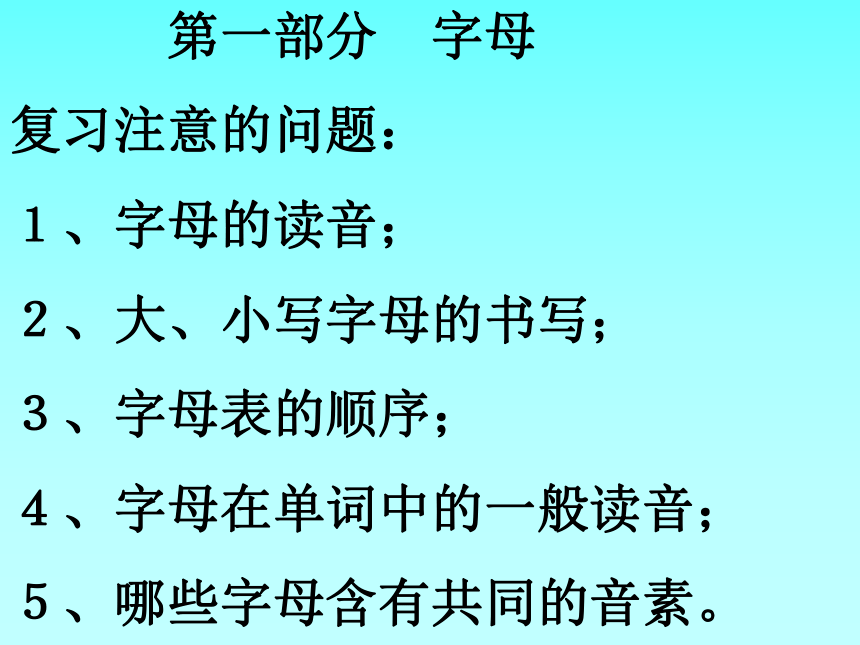
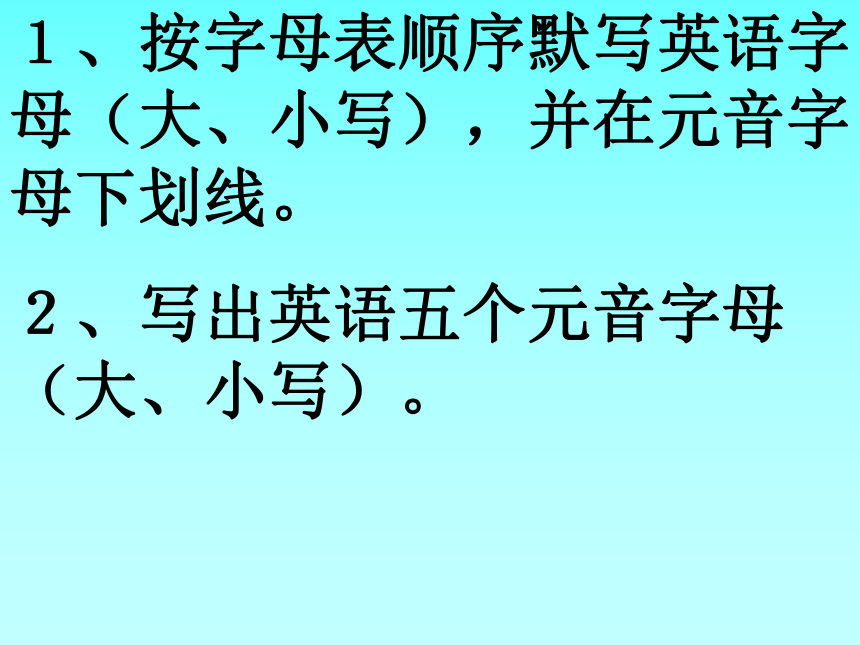
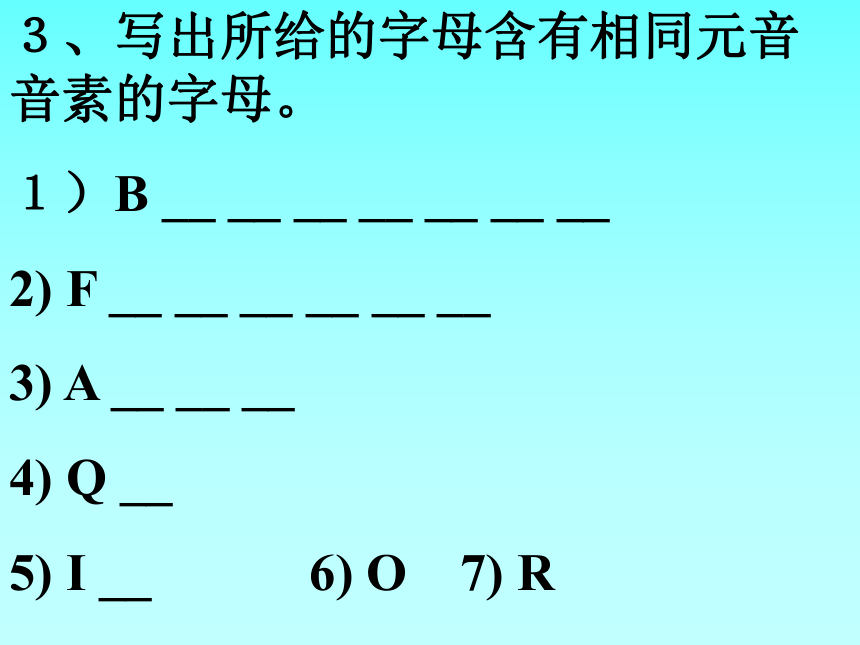
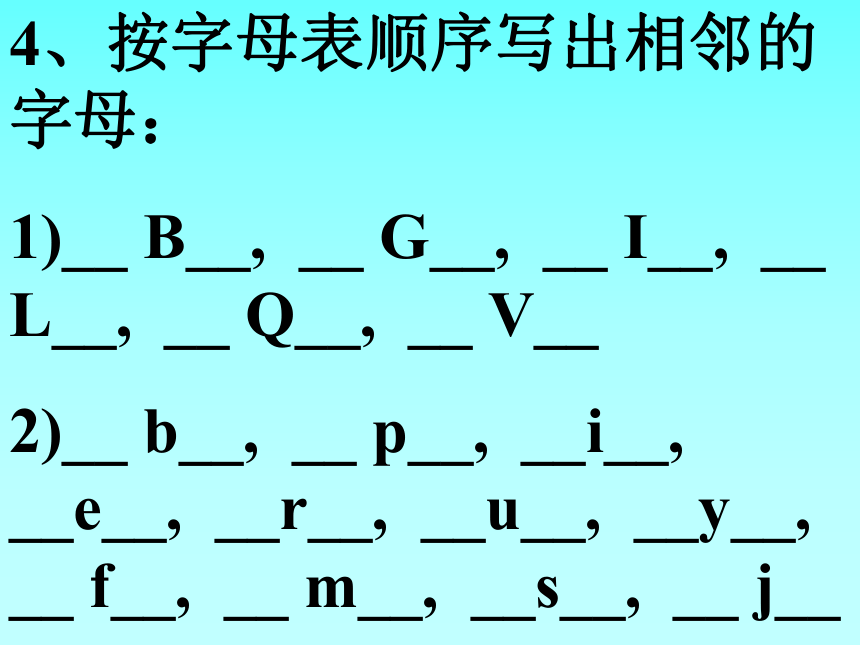
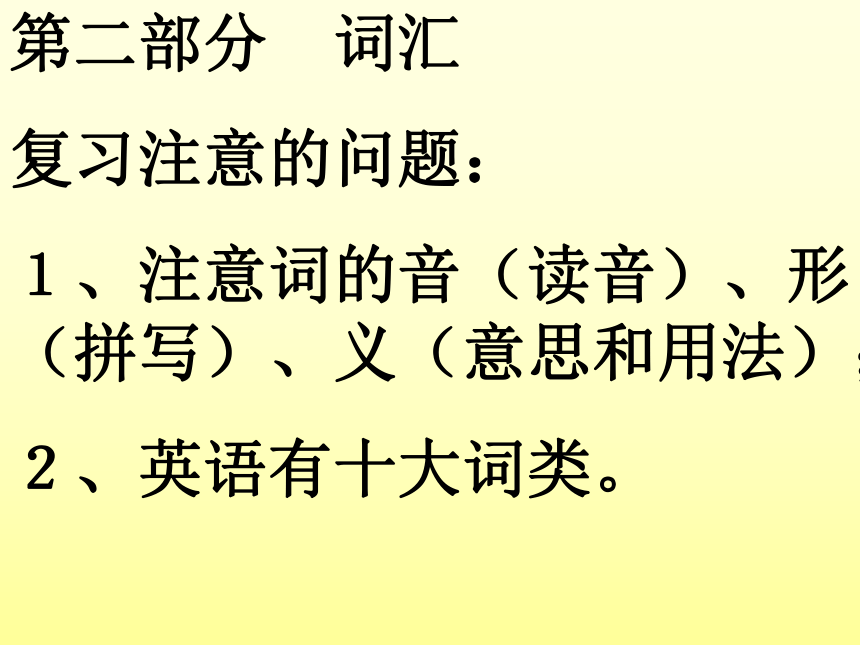
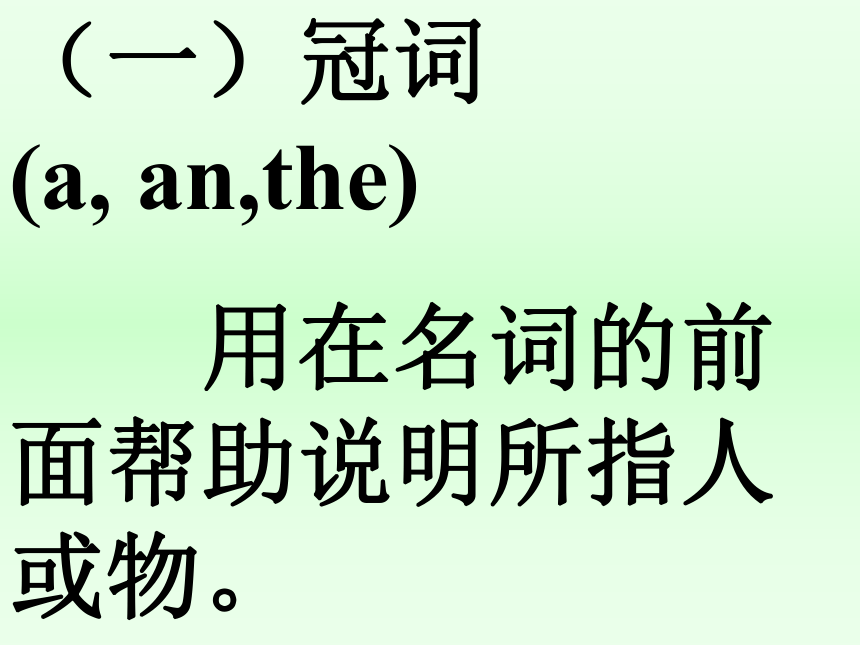
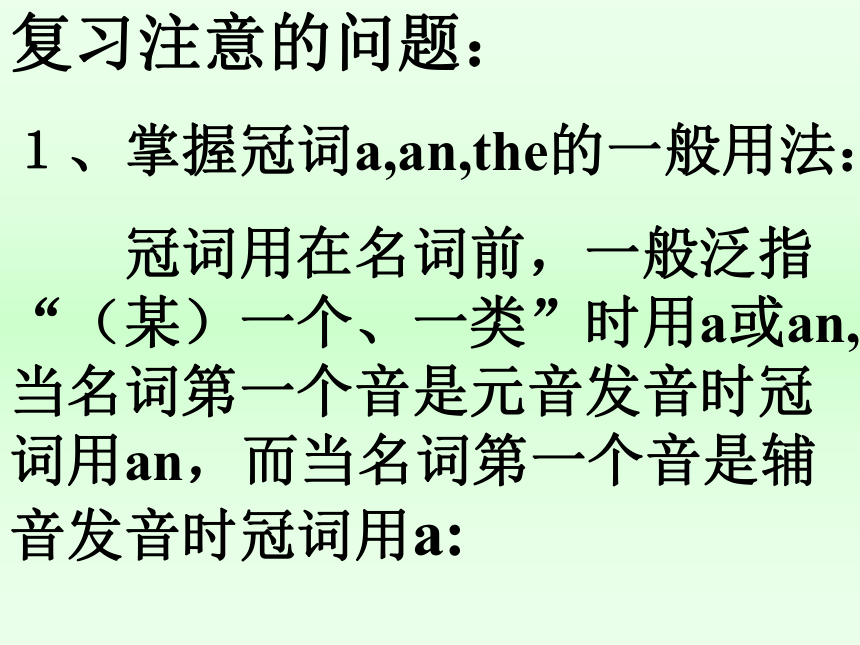
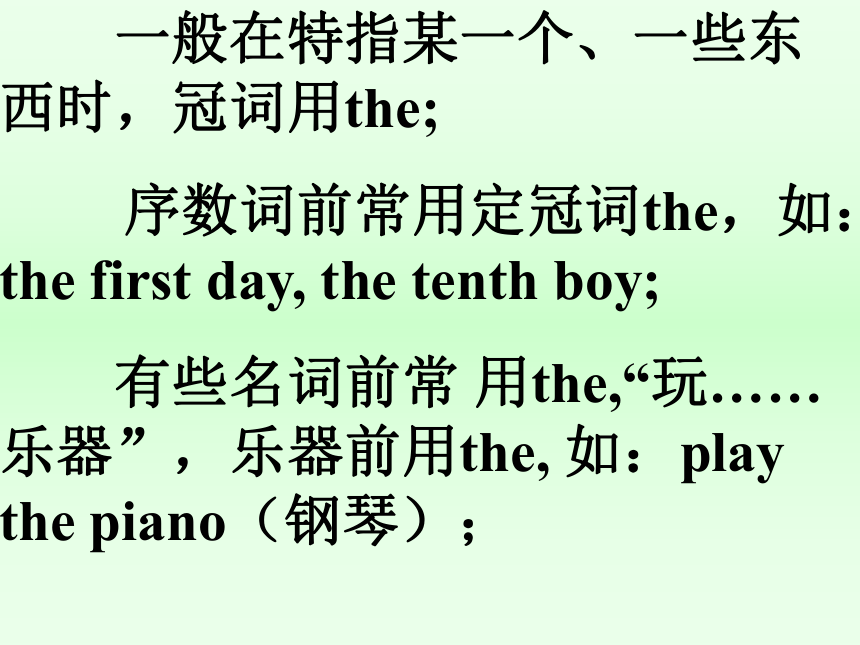
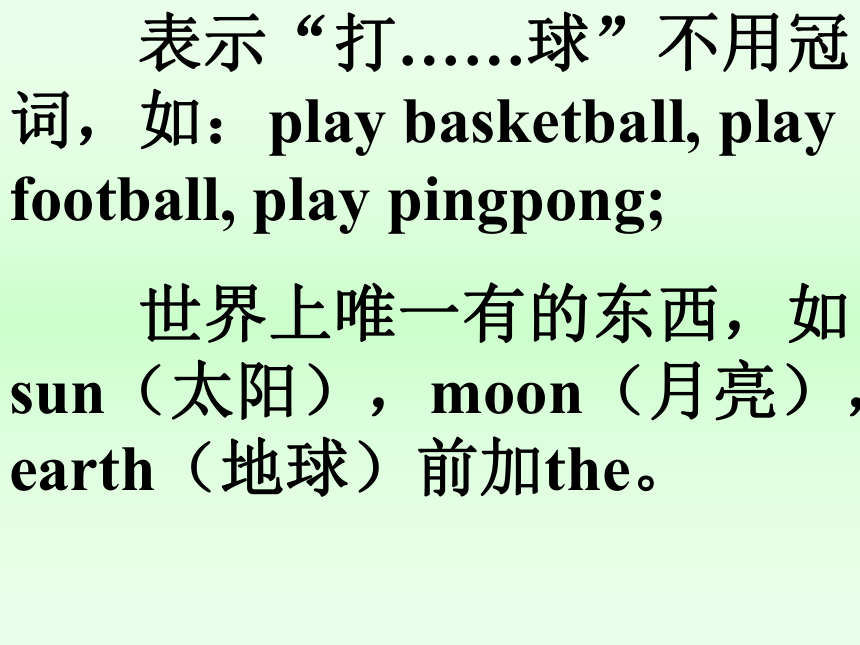
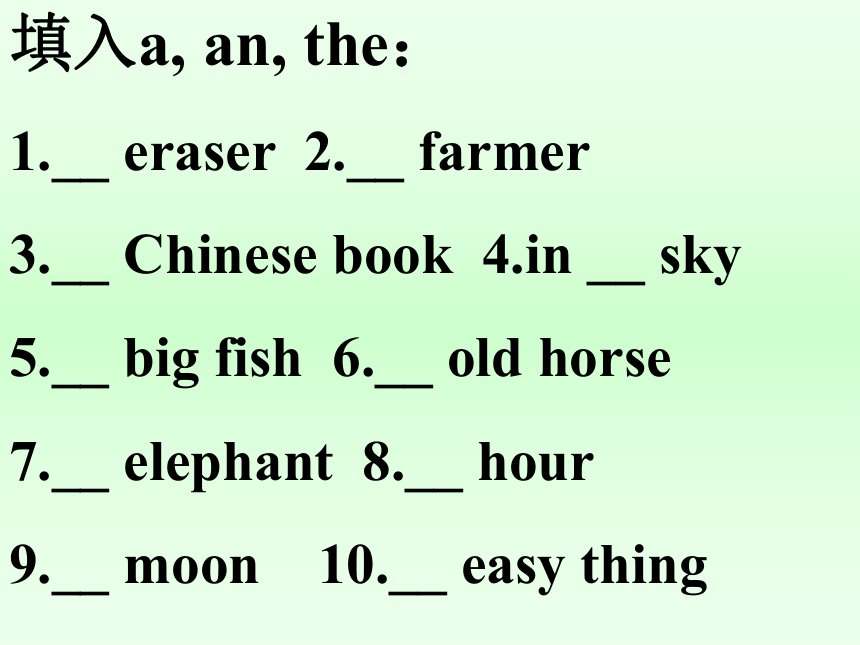
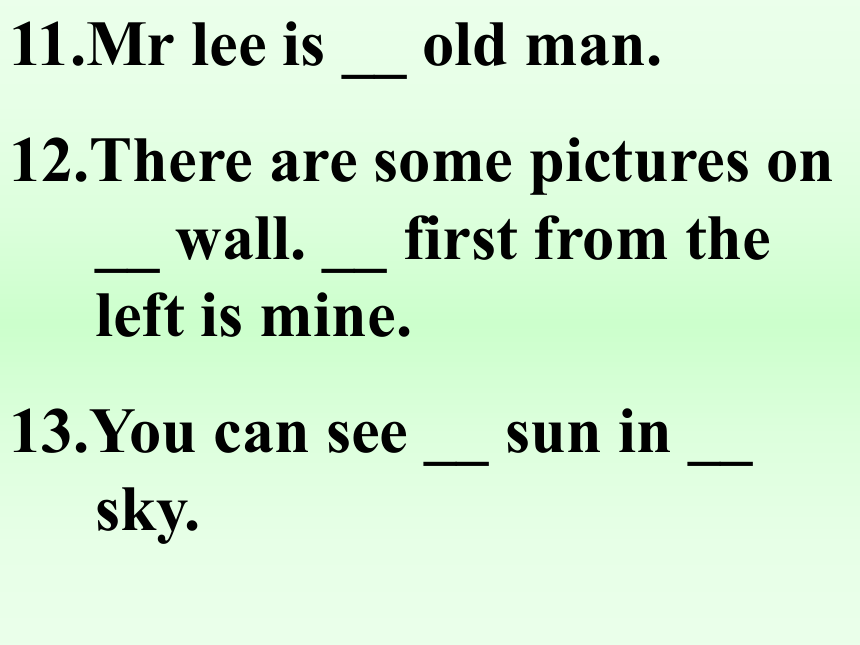
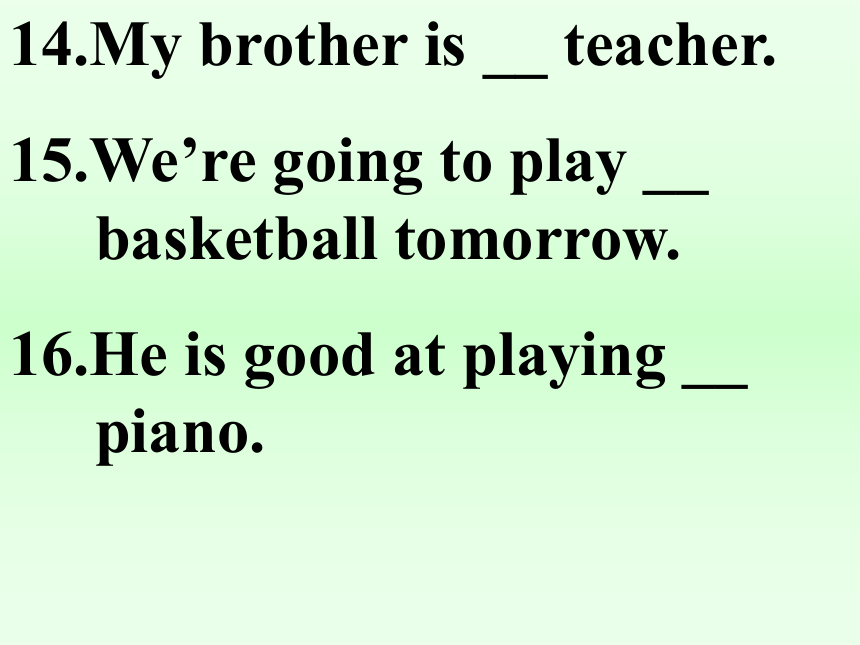
文档简介
课件124张PPT。 第一部分 字母
复习注意的问题:
1、字母的读音;
2、大、小写字母的书写;
3、字母表的顺序;
4、字母在单词中的一般读音;
5、哪些字母含有共同的音素。1、按字母表顺序默写英语字母(大、小写),并在元音字母下划线。
2、写出英语五个元音字母(大、小写)。3、写出所给的字母含有相同元音音素的字母。
1)B __ __ __ __ __ __ __
2) F __ __ __ __ __ __
3) A __ __ __
4) Q __
5) I __ 6) O 7) R4、按字母表顺序写出相邻的字母:
1)__ B__, __ G__, __ I__, __ L__, __ Q__, __ V__
2)__ b__, __ p__, __i__, __e__, __r__, __u__, __y__, __ f__, __ m__, __s__, __ j__第二部分 词汇
复习注意的问题:
1、注意词的音(读音)、形(拼写)、义(意思和用法);
2、英语有十大词类。(一)冠词 (a, an,the)
用在名词的前面帮助说明所指人或物。复习注意的问题:
1、掌握冠词a,an,the的一般用法:
冠词用在名词前,一般泛指“(某)一个、一类”时用a或an,当名词第一个音是元音发音时冠词用an,而当名词第一个音是辅音发音时冠词用a: 一般在特指某一个、一些东西时,冠词用the;
序数词前常用定冠词the,如:the first day, the tenth boy;
有些名词前常 用the,“玩……乐器”,乐器前用the, 如:play the piano(钢琴); 表示“打……球”不用冠词,如:play basketball, play football, play pingpong;
世界上唯一有的东西,如sun(太阳),moon(月亮),earth(地球)前加the。填入a, an, the:
1.__ eraser 2.__ farmer
3.__ Chinese book 4.in __ sky
5.__ big fish 6.__ old horse
7.__ elephant 8.__ hour
9.__ moon 10.__ easy thing11.Mr lee is __ old man.
12.There are some pictures on __ wall. __ first from the left is mine.
13.You can see __ sun in __ sky. 14.My brother is __ teacher.
15.We’re going to play __ basketball tomorrow.
16.He is good at playing __ piano.17.I have __ football. Would you like to play __ football with me?
18.Do you take __ exercise __ every day?
19.I have __ ticket. It’s from my uncle.20.May I watch __ TV?
21.Turn right at __ third crossing. The school is on __ left.
22.Please read __ fifth lesson.
23.Is there __ English book on __ desk?24.__ man in white is my teacher.
25.Which is your shirt, __ white one or __ old one?
26.There is __ “u” in the word “sun”.27.There is __ “h” on the blackboard.
28.There is __ apple on __ desk.
__ apple is red.
29.There are sixty minutes in __ hour.30.I went to school at 6:30 __ this morning.(二)名词
表示人或事物的名称。复习注意的问题:
1、总的来说,名词分专有名词和普通名词两类。专有名词是个别的人、事物、地点等专有的名称,如:Mike, China。专有名词的第一个字母要大写。2、名词按其所表示的事物的性质分为可数名词和不可数名词,可数名词有复数形式:two apples, some cars, three pens, many watches
不可数名词没有复数形式:some water, a lot of bread, much paper
一些表示物质的不可数名词的量常用下面的方法来表示: a glass of water, two cups of tea, some bottles of orange3、名词单、复数 可数名词有单数和复数两种形式,名词复数的构成的规则是: 1)直接加~s , 如:pen—pens 2)以s, x, ch, sh结尾的词,加~es, 如:bus—buses box—boxes watch—watches 部分以o结尾的词,加~es,如:potato—potatoes tomato--tomatoes 3)以辅音+y结尾的词,把y改为i 再加~es, 如:family—families factory—factories city—cities lady—ladies 4)以 f 或 fe 结尾的词,改为ves, 如:knife—knives life—lives 5)特殊形式: sheep—sheep man—men child—children tooth—teeth foot—feet Chinese—Chinese English—English Japanese---Japanese 名词复数发音规则: 1.s 在清辅音后发 /s/, 在浊辅音和 元音后发 /z/; 2. es在元音后发/z/,其余发/iz/; 3. ies发/iz/ 4. ves发 /vz/不可数名词,如: water rice congee milk bread food money coffee fish hair ink chicken beef pork meat tea snow rain wind paper grass news4、名词的所有格
1)单数名词的所有格构成方法是在词尾加~’s,如:
Kate’s bedroom, my father’s hat, their teacher’s books
2)以s结尾的复数名词所有格的构成方法是在单数词尾加~‘s,如:the teachers’ room, the workers’ families
3)不以s结尾的复数名词所有格的构成方法是在词尾加~’s,如:
men’s clothes, children’s toys5、专有名词每一个的开头一般用大写,如:
China, Chinese, Sydney, Japanese, No. 1 Middle School, England一、写出下面名词的复数形式:
1.coat 2.people 3.city 4.watch 5.bus 6.family 7.man 8.factory 9.knife 10.child 11.lady 12. class 13.boy 14.baby 15.fish 16. box 17. foot 18.sheep 19.policeman 20.country 21.woman 22.glass 23.milk 24.Chinese 25.life
二、把下面的词组译成英语:
1、一盒鸡蛋 2、许多瓶橙汁
3、三(玻璃杯)牛奶 4、四张白纸
5、两盘鱼 6、十三瓶水
7、二片面包 8、五杯茶
9、八公斤牛肉 10、十九袋米根据提示用适当的名词形式填空:
1.I have two __ ( knife).
2.There’s some __ (water) in the bottle.
3.I can see two __ (pencil-box) in the desk.
4.Would you like some __ (meat)?5.May I have a cup of __ (tea)?
6.The USA and the UK are two __ (country).
7.She is washing her __ (clothes).
8.How many __ ( people) are there in your family?
9.He can’t catch any __ (fish).10.Those __ (woman) are from Canada.
11.I have ten __ of __ (box,apple).
12.They like __(green tea).
13.Can he speak __ (English)?
14.Tom and Jim are in the same __ (class).15.They are in the different __ (class).(三)形容词
用来修饰名词,表示人或事物的特征。 大多数形容词有三个等级:1)原级,即原形。 表示“与……一样”。(as…as)
2)比较级,表示“较……”或“更……一些”的意思。(~er…than或more…than)
3)最高级,表示“最……”的意思。(the ~est或the most ~)写出下列形容词的变换词:
1.strong(比较级)
2.more(最高级)
3.good(最高级)
4.delicious(比较级)
5.beautiful(最高级)6.better(原形)
7.hot (最高级)
8.heavy(比较级)
9.sad(比较级)
10.careful(最高级)Model:tall—taller—tallest 1.big 2.good 3.new 4.afraid 5.cold 6.many/much 7.warm 8.expensive 9.busy 10.fine 11.fast 12.strong 13.young 14.early 15.sad 16.easy 17.hungry 18.angry 19.heavy 20.happy 21.nice 22.beautiful 23.delicious 24.hot 25.clean 26.light 27.small 28.thin 29.thick 30.huge 31.sunny 32.rainy 33.windy 34.cloudy 35.dirty 36.cool 37.wet 38.dry 39.tidy 40. messy 41.loud 42.slow 43.tasty 44.yucky 45.spicy 46.snowy 47.sick 48.long 49.great 50.near 51.clear 52.old 53.cheap 54.short 55.far 56.scared 57.excited 58.tired 59.upset 60.late 61.healthy 62.enough 63.dangerous 64.bad Model:tall—taller—tallest 1.big—bigger--biggest 2.good—better—best 3.new—newer---newest 4.afraid—more afraid—most afraid 5.cold—colder---coldest 6.many/much—more---most 7.warm—warmer---warmest 8.expensive—more expensive—most expensive 9.busy—busier---busiest 10.fine—finer---finest 11.fast—faster---fastest 12.strong—stronger—strongest 13.young—younger—youngest 14.early—earlier—earliest 15.sad—sadder--saddest 16.easy—easier--easiest17.hungry—hungrier—hungriest 18.angry—angrier--angriest 19.heavy—heavier—heaviest 20.happy—happier—happiest 21.nice—nicer—nicest 22.beautiful—more beautiful—most beautiful 23.delicious—more delicious—most delicious 24.hot—hotter—hottest 25.clean—cleaner--cleanest 26.light—lighter—lightest 27.small—smaller—smallest 28.thin—thinner--thinnest 29.thick—thicker—thickest 30.huge—huger—hugest31.sunny—sunnier—sunniest 32.rainy—rainier—rainiest 33.windy—windier—windiest 34.cloudy—cloudier—cloudiest 35.dirty—dirtier--dirtiest 36.cool—cooler--coolest 37.wet—wetter--wettest 38.dry—drier--driest 39.tidy—tidier--tidiest 40. messy—messier--messiest 41.loud—louder--loudest 42.slow—slower--slowest 43.tasty—tastier--tastiest 44.yucky—yuckier--yuckiest45.spicy—spicier--spiciest 46.snowy—snowier—snowiest 47.sick—sicker--sickest 48.long—longer—longest 49.great—greater—greatest 50.near—nearer—nearest 51.clear—clearer—clearest 52.old—older/ elder—oldest/ eldest 53.cheap—cheaper—cheapest 54.short—shorter—shortest 55.far—farther/ further—farthest/ furthest 56.scared—more scared—most scared 57.excited—more excited—most excited 58.tired—more tired—most tired59.upset—more upset—most upset 60.late—later--latest 61.healthy—more healthy—most healthy 62.enough—more enough—most enough 63.dangerous—more dangerous—most dangerous 64.bad—worse—worst 写出下列形容词的反义词: 1.big 2.good 3.new 4.cold 5.warm 6.expensive 7.fast 8.young 9.early 10.sad 11.easy 12.hungry 13.heavy 14.beautiful 15.delicious 16.clean 17.thin 18.wet 19.tidy 20.tasty 21.long 22.near 23.healthy 写出下列形容词的反义词: 1.big—small 2.good—bad 3.new—old 4.cold—hot 5.warm—cool 6.expensive—cheap 7.fast—slow 8.young—old 9.early—late 10.sad—happy 11.easy—hard 12.hungry—full 13.heavy—light 14.beautiful—ugly 15.delicious—yucky 16.clean—dirty 17.thin—thick 18.wet—dry 19.tidy—messy 20.tasty—yucky 21.long—short 22.near—far 23.healthy—unhealthy 1.Betty is __ (young) than Lucy.
2.Is Li Lei as __(tall) as Liu Dong?
3.Tom is __(good) student in our class.
4.My cousin isn’t __(short) in his family.
5.Our city is __(beautiful) than before.
6.Which box is __(heavy), the red one or the blue one?
7.Were you __(hungry) yesterday?
8. The red hat is __(big) of all.9.Lucy is __(happy) in his family.
10.The moon cake is____ (delicious) than that cake.1.This box isn’t heavy. It’s___.
2.The pigs aren’t thin. They’re__.
3.Is your classroom clean or ___?
4.His father isn’t tall. He’s__.5.Is this an__ box or a full box?(四) 数词
表示数量和顺序。
分为基数词和序数词。复习注意的问题:
1、基数词表示数目,注意表示“十几”,除了eleven, twelve其他用- teen结尾;注意表示‘几十“用 -ty结尾。
2、序数词表示顺序:注意表示“第几”时,除了first, second, third 其他用th结尾。但注意fifth, eighth, ninth, twelfth 的拼写,序数词前必须加the。
3、百位数的读法,如:
105 one hundred and five
217 two hundred and seventeen
560 five hundred and sixty
one two three four five six seven eight nine ten eleven twelve thirteen fourteen fifteen sixteen seventeen eighteen nineteen twenty twenty-one thirty forty fifty sixty seventy eighty ninety one hundredfirst second third fourth fifth sixth seventh eighth ninth tenth eleventh twelfth thirteenth fourteenth fifteenth sixteenth seventeenth eighteenth nineteenth twentieth twenty-first thirtieth thirty-ninth fortieth fiftieth sixtieth seventieth eightieth ninetieth hundredth 选择适当的数词填空:
1.There are __(four, fourth) pictures on the wall.
2.This is the __(one, first) house in the street.
3.I have got __(eleven, eleventh) American stamps.4.Jim is Mr King’s __(one, first) child.
5.It’s __(five, fifth) o’clock now.
6.I think he is __(ten, tenth) years old.
7.What’s nine and three? It’s __(eleven, twelve).8.Two hundred and three hundred is __(six hundred, five hundred).(五)介词
at (在…) in(在…里面)to(到) on(在…上)under(在…下面)after(在…以后)before(在…以前)from(从…来) by(乘)of(…的) above(在…上面)below(低于)behind(在…后面)front(前面) in front of(在…前面)near(接近) next to(在…旁边) back(回原处) during(在…期间) with(和、用) over(超过、结束) like(同…一样) over there(在那边)1.Jim was born __ February 18,1981.
A.in B.on C.at D.of
2.We stay __ home __ Sundays.
A.in, on B.at, at C.for, on D.at,on3.You can buy thing in the shop __ nine __ the evening.
A.at,in B.in,at C.before, in D.at, on
4.Mid-Autumn Day usually comes __ September or October.
A.in B.on C.at D.for5.We like swimming in rivers and lakes __ summer.
A.on B.to C.in D.at
6.The students will go home __ school.
A.after B.over C.behind D.at7.There will be snow __ night.
A.at B.to C.in D.for
8.Spring is the best season __ the year.
A.of B.in C.on D.for9.At night, we often stay __ home. A.in B.at C.to D.of
10.Look! Some students are playing __ the playground. A.in B.at C.on D.of
11.The teacher has the student’s names __ a piece __ paper. A.on,of B.in,off C.at,of D.on,for 12.There are many apples __ that tree. A.in B.at C.of D.on
13.There is a bird __ the tree. A.on B.up C.at D.in
14.__ the hill there are many young trees. A.In B.On C.Over D.Of15.There is a map of China __ the wall. A.on B.in C.at D.of
16.There is a window __ the wall. A.on B.in C.at D.of
17.They are __ different classes.
A.at B.in C.on D.to18.“Is Wei Hua __ school today?” “No, I think she’s __ home.” A.in,in B.in,at C.at,in D.at,at 19.Please open your books __ Page 8. A.in B.at C.on D.to 20.We have a lot of friends __ the world. A.in B.on C.to D.at21.Lucy and lily were born __ America. A.at B.to C.of D.in 22.We can see the station __ the window. A.for B.from C.to D.in 23.Please turn __ the radio. I want to listen __ this song. A.to,to B.off,at C.on,to D.in,to24.Don’t worry __ your father. A.with B.for C.about D.on
25.I’m doing my homework. Please turn __ the radio. A.on B.off C.to D.over
26.Will you look __ my mother for me. A.for B.of C.at D.after27.My father bought a new book __ me. A.to B.for C.of D.on
28.Jim often helps me __ my English. A.in B.on C.about D.with
29.The hat looks __ a cat. A.at B.for C.up D.like30.Don’t forget to turn __ the light(灯)when you leave the room. A.of B.in C.off D.on
31.Can you write letters __ English. A.with B.in C.by D.use(用)
32.The basket is full __ things. A.about B.of C.with D.by33.Put __ your coat,boy. It’s cold outside(外面). A.on B.of C.down D.in
34.__ the beginning __ the race, Tom ran the fastest. A.At,of B.In,to C.For,on D.To,of
35.It’s time __ class.
A.to B.for C.in D.at36.Summer comes __ spring. A.before B.after C.front D.behind
37.I had bread and milk __ breakfast today. A.in B.on C.for D.of
38.What’s this __ English? A.in B.on C.for D.of39.The woman __ red is our English teacher. A.on B.under C.up D.in
40.__ her way to school, she bought some food for supper. A.To B.For C.On D.At
41.Welcome back __ our school. A.for B.at C.in D.to42.I’m going to give our English teacher a card __ Teachers’ Day. A.to B.on C.for D.of
43.What’s the weather __ in Zhongshan? A.for B.on C.like D.of
44.Who’s __ duty today? A.at B.on C.in D.for45.“Where are you going?” “I’m going to the library.What __ you.” A.about B.on C.to D.at
46.What’s wrong __ your bike? A.on B.about C.in D.with
47.All of us are good __ English. A.for B.on C.in D.at48.There’s something wrong __ my watch. A.to B.on C.with D.of 49.Can you say “苹果”__ English? Write the word out __ the pen. A.in,with B.with,in C.in,in D.with,with 50.Tom watched TV __ his parents last night. A.to B.at C.with D.on(六)代词
通常用来指代名词或名词词组的词。(1)人称代词
(2)物主代词
(3)反身代词
(4)不定代词
some—any many--- much
something—anything-- nothing1.__ hat is in the desk. A.My B.He C.Mine D.Hers
2.She is a teacher. __ name is Gao Hui. A.Its B.Her C.Hers D.His
3.It’s a bird. I don’t know __ name. A.it’s B.its C.it D.its’4.Can I borrow __ knife? A.your B.you C.my D.me
5.He bought a knife on __ way home. A.her B.his C.him D.her’s
6.Rice is __ favourite.
A.we B.us C.ours D.our7.The black shoes are __. A.they B.their C.them D.theirs
8.Lucy has a book like this one. I think it is __. A.hers B.him C.his D.her
9.”Kate, is this your ruler?” “Yes, it’s __.” A.my B.mine C.me D.mine ruler10.Their English teacher is a woman and __ is a man. A.our B.us C.we D.ours
11.My name is Meimei. What’s __? A.you B.your C.yours D.your’s
12.A friend of __ will be here. A.my B.his C.her D.him13.My room is bigger than __. A.her B.hers C.she D.him
14.Can you give it to __ tomorrow? A.she B.her C.his D.hers
15.”Help __,” Mr Chen said to the children. A.you B.yours C.yourself D.yourselves16.Would you like __ milk? A.some B.one C.a D.any 17.Do you have __ water? A.a B.the C.some D.any 18.We’re very busy because we have so __ books to read and so __ homework to do every day. A.much,many B.many,much C.many, a lot D.a lot, much19.Can I have __ meat? Sorry, you can’t have __ meat? A.any,any B.some,any C.some,some D.any,much
20.Are __ in the pencil-box? A.the thing B.all the thing C.all the things D.all thing 21.“Is there __ in the classroom?” “No, __ is in.” A.somebody,anybody B.anybody,everybody C.anybody,nobody D.nobody,somebody22.There isn’t __ wrong with the bike. A.something B.somebody C.anything D.everything 23.Would you like __ to drink, Tim? No, thanks. A.something B.nothing C.anything D.everything(七)动词
表示动作或状态的词。复习注意的问题:
1、动词时态:
(1)一般现在时:一般现在时表示平常的状态、习惯的动作和经常性的动作。
一般现在时当主语是第三人称单数时,动词的几种变化:1)一般在词尾加-s,如:
help-helps, work-works , get-gets
2)以字母s, x, sh, ch, 或o结尾的动 词,在词尾加-es,如:
watch-watches, teach-teaches,
go-goes, do-does, wash-washes 3)以辅音字母加y结尾的动词,把 y改为i再加-es, 如:
study-studies, fly-flies, carry-carries, cry-cries
4)不规则变化的动词有:
have-has(2)现在进行时:
现在进行时用来表示现在进行或发生的动作。
动词-ing形式构成的规则是:
1)一般动词加-ing,如: work-working, play-playing, sing-singing2)以不发音字母e结尾的动词,先去掉e,再加-ing,如:
come-coming, write-writing
close-closing, leave-leaving
3)以重读闭音节结尾的动词,如 词尾只有一个辅音字母,要先 双写这个字母,再加-ing,如: get-getting, put-putting, sit-sitting, run-running, swim-swimming, cut-cutting begin-beginning shop-shopping, stop-stopping(3)一般过去时
一般过去时表示过去某个时间发生的动作或存在的状态。
动词一般过去式的构成规则是:
1)一般在词尾加-ed,如: look-looked, play-played, visit-visited, help-helped2)结尾是e的动词加-d,如:
live-lived, close-closed
like-liked, hope-hoped3)末尾只有一个辅音字母的重读 闭音节词,先双写这个辅音字 母,再加-ed,如:
stop-stopped, 4)结尾是“辅音+y”的动词,先变 “y”为“i”再加-ed,如:
study-studied, carry-carried
5)不规则动词: am/is-was, are-were, begin-began, build-built, buy-bought, can-could, come-came, cut-cutdo-did, drink-drank, fly-flew, forget-forgot, get-got, give-gave, go-went, grow-grew, have/has-had, keep-kept, leave-left, make-made, meet-met, put-put, read-read, run-ran, say-said, sing-sang, sit-sat, swim-swam, take-took, tell-told, write-wrote (4)一般将来时
一般将来时表示将要或未来会发生的情况或动作。(5)时态结构及提示词:
1)一般现在时用动词原形,但第三人称单数后要加词尾-s。
提示词:every day(week, month,year…) , sometimes, often, always(总是), usually 和一些特殊的词:like, love, want2)现在进行时
be(am,is,are) + Ving
提示词:now, listen ,look3)一般过去时用动词的过去式。
提示词:last night (week, month, year…), yesterday, the day before yesterday, ago,4)一般将来时
be going to + 动词原形
will +动词原形
提示词:tomorrow, the day after tomorrow, next week (month,year) 按要求写出下列动词的不同形式:Model:play-plays-playing-played 1.do 2.go. 3.write 4.come 5.put 6.study 7.stay 8.get 9.carry 10.sing 11.watch 12.begin 13.swim 14.see 15.run 16.say 17.have 18.make 19.fly 20.give 21.buy 22.ask 23.live 24.take 25.sit 26.close 27.wash 28.cry 29.cut 30.learn
1.Jim often __ TV at home in the evening. A.watch B.watches C.watched D.watching 2.”__ your father usually __ on Sundays?” “Yes, he does.” A.Do,work B.Does,work C.Did,works D.Is,working3.Sometimes my parents __ back home late. They don’t have supper at home. A.comes B.came C.come D.is coming 4.Tom __ his homework after breakfast. A.don’t B.doesn’t C.don’t do D.doesn’t do5.__ your parents in Shanghai last year? A.Is B.Are C.Was D.Were
6.Lucy __ a letter to her mother three days ago. A.wrote B.writes C.write D.is writing7.He __ with us yesterday morning. A.doesn’t go swimming B.goes swimming C.didn’t go swimming D.Went to swimming
8.There __ a basketball match in our school the day after tomorrow. A.will be B.will have C.is going to have D.would be9.__ you __ us a talk(演讲)this afternoon? A.Are,giving B.Are,gave C.Will,give D.Were,going to give
10.Look! Li Lei __ Jim with his Chinese. A.is helping B.helped C.is going to help D.helps11.The students of Class 3 __ a football game now. A.are having B.will have C.is having D.will be had 12.My mother __ breakfast when I __ my face every morning. A.cooks,am washing B.is cooking, am washing C.cooked, washed D.will cook, washes13. Last month, they __ the train to Beijing. A.took B.takes C.take D.taking 14. May I __ football now? A.am playing B.play C.am going to play D.played
15. I __ a doctor when I grow up.
A.am B.will C.will be D.was
Be( am, is, are, was, were)的用法:1.Tom:Yesterday __ Jim’s birthday. There __ a birthday party at his house. Mary: __ you at the party yesterday? Tom: Yes, I __. Mary: How many people __ there at the party? Tom: There __ five boys and four girls. Mary: __ Li Lei at the party? Tom: Yes, he __, but he __ late. 2.I __ watching TV now. My brother __ flying a kite. 3.Betty __ tall now, but two years ago she __ short. 4.What __ you going to do? We __ going to go to the park. 5.They __ in Guangzhou last summer. 6.I __ going to make the cake myself.7.__ your English teacher here an hour ago.
8.I __ in England last week.
9.Today __ Monday.
10.What __ the weather like yesterday?
11.Where __ you born?12.Tom and I __ at a meeting a minute ago.
13.The farmers __ in a supermarket now.
14.I__ watching TV in the room.
15.__ your brother in Grade 5 a year ago?
复习注意的问题:
1、字母的读音;
2、大、小写字母的书写;
3、字母表的顺序;
4、字母在单词中的一般读音;
5、哪些字母含有共同的音素。1、按字母表顺序默写英语字母(大、小写),并在元音字母下划线。
2、写出英语五个元音字母(大、小写)。3、写出所给的字母含有相同元音音素的字母。
1)B __ __ __ __ __ __ __
2) F __ __ __ __ __ __
3) A __ __ __
4) Q __
5) I __ 6) O 7) R4、按字母表顺序写出相邻的字母:
1)__ B__, __ G__, __ I__, __ L__, __ Q__, __ V__
2)__ b__, __ p__, __i__, __e__, __r__, __u__, __y__, __ f__, __ m__, __s__, __ j__第二部分 词汇
复习注意的问题:
1、注意词的音(读音)、形(拼写)、义(意思和用法);
2、英语有十大词类。(一)冠词 (a, an,the)
用在名词的前面帮助说明所指人或物。复习注意的问题:
1、掌握冠词a,an,the的一般用法:
冠词用在名词前,一般泛指“(某)一个、一类”时用a或an,当名词第一个音是元音发音时冠词用an,而当名词第一个音是辅音发音时冠词用a: 一般在特指某一个、一些东西时,冠词用the;
序数词前常用定冠词the,如:the first day, the tenth boy;
有些名词前常 用the,“玩……乐器”,乐器前用the, 如:play the piano(钢琴); 表示“打……球”不用冠词,如:play basketball, play football, play pingpong;
世界上唯一有的东西,如sun(太阳),moon(月亮),earth(地球)前加the。填入a, an, the:
1.__ eraser 2.__ farmer
3.__ Chinese book 4.in __ sky
5.__ big fish 6.__ old horse
7.__ elephant 8.__ hour
9.__ moon 10.__ easy thing11.Mr lee is __ old man.
12.There are some pictures on __ wall. __ first from the left is mine.
13.You can see __ sun in __ sky. 14.My brother is __ teacher.
15.We’re going to play __ basketball tomorrow.
16.He is good at playing __ piano.17.I have __ football. Would you like to play __ football with me?
18.Do you take __ exercise __ every day?
19.I have __ ticket. It’s from my uncle.20.May I watch __ TV?
21.Turn right at __ third crossing. The school is on __ left.
22.Please read __ fifth lesson.
23.Is there __ English book on __ desk?24.__ man in white is my teacher.
25.Which is your shirt, __ white one or __ old one?
26.There is __ “u” in the word “sun”.27.There is __ “h” on the blackboard.
28.There is __ apple on __ desk.
__ apple is red.
29.There are sixty minutes in __ hour.30.I went to school at 6:30 __ this morning.(二)名词
表示人或事物的名称。复习注意的问题:
1、总的来说,名词分专有名词和普通名词两类。专有名词是个别的人、事物、地点等专有的名称,如:Mike, China。专有名词的第一个字母要大写。2、名词按其所表示的事物的性质分为可数名词和不可数名词,可数名词有复数形式:two apples, some cars, three pens, many watches
不可数名词没有复数形式:some water, a lot of bread, much paper
一些表示物质的不可数名词的量常用下面的方法来表示: a glass of water, two cups of tea, some bottles of orange3、名词单、复数 可数名词有单数和复数两种形式,名词复数的构成的规则是: 1)直接加~s , 如:pen—pens 2)以s, x, ch, sh结尾的词,加~es, 如:bus—buses box—boxes watch—watches 部分以o结尾的词,加~es,如:potato—potatoes tomato--tomatoes 3)以辅音+y结尾的词,把y改为i 再加~es, 如:family—families factory—factories city—cities lady—ladies 4)以 f 或 fe 结尾的词,改为ves, 如:knife—knives life—lives 5)特殊形式: sheep—sheep man—men child—children tooth—teeth foot—feet Chinese—Chinese English—English Japanese---Japanese 名词复数发音规则: 1.s 在清辅音后发 /s/, 在浊辅音和 元音后发 /z/; 2. es在元音后发/z/,其余发/iz/; 3. ies发/iz/ 4. ves发 /vz/不可数名词,如: water rice congee milk bread food money coffee fish hair ink chicken beef pork meat tea snow rain wind paper grass news4、名词的所有格
1)单数名词的所有格构成方法是在词尾加~’s,如:
Kate’s bedroom, my father’s hat, their teacher’s books
2)以s结尾的复数名词所有格的构成方法是在单数词尾加~‘s,如:the teachers’ room, the workers’ families
3)不以s结尾的复数名词所有格的构成方法是在词尾加~’s,如:
men’s clothes, children’s toys5、专有名词每一个的开头一般用大写,如:
China, Chinese, Sydney, Japanese, No. 1 Middle School, England一、写出下面名词的复数形式:
1.coat 2.people 3.city 4.watch 5.bus 6.family 7.man 8.factory 9.knife 10.child 11.lady 12. class 13.boy 14.baby 15.fish 16. box 17. foot 18.sheep 19.policeman 20.country 21.woman 22.glass 23.milk 24.Chinese 25.life
二、把下面的词组译成英语:
1、一盒鸡蛋 2、许多瓶橙汁
3、三(玻璃杯)牛奶 4、四张白纸
5、两盘鱼 6、十三瓶水
7、二片面包 8、五杯茶
9、八公斤牛肉 10、十九袋米根据提示用适当的名词形式填空:
1.I have two __ ( knife).
2.There’s some __ (water) in the bottle.
3.I can see two __ (pencil-box) in the desk.
4.Would you like some __ (meat)?5.May I have a cup of __ (tea)?
6.The USA and the UK are two __ (country).
7.She is washing her __ (clothes).
8.How many __ ( people) are there in your family?
9.He can’t catch any __ (fish).10.Those __ (woman) are from Canada.
11.I have ten __ of __ (box,apple).
12.They like __(green tea).
13.Can he speak __ (English)?
14.Tom and Jim are in the same __ (class).15.They are in the different __ (class).(三)形容词
用来修饰名词,表示人或事物的特征。 大多数形容词有三个等级:1)原级,即原形。 表示“与……一样”。(as…as)
2)比较级,表示“较……”或“更……一些”的意思。(~er…than或more…than)
3)最高级,表示“最……”的意思。(the ~est或the most ~)写出下列形容词的变换词:
1.strong(比较级)
2.more(最高级)
3.good(最高级)
4.delicious(比较级)
5.beautiful(最高级)6.better(原形)
7.hot (最高级)
8.heavy(比较级)
9.sad(比较级)
10.careful(最高级)Model:tall—taller—tallest 1.big 2.good 3.new 4.afraid 5.cold 6.many/much 7.warm 8.expensive 9.busy 10.fine 11.fast 12.strong 13.young 14.early 15.sad 16.easy 17.hungry 18.angry 19.heavy 20.happy 21.nice 22.beautiful 23.delicious 24.hot 25.clean 26.light 27.small 28.thin 29.thick 30.huge 31.sunny 32.rainy 33.windy 34.cloudy 35.dirty 36.cool 37.wet 38.dry 39.tidy 40. messy 41.loud 42.slow 43.tasty 44.yucky 45.spicy 46.snowy 47.sick 48.long 49.great 50.near 51.clear 52.old 53.cheap 54.short 55.far 56.scared 57.excited 58.tired 59.upset 60.late 61.healthy 62.enough 63.dangerous 64.bad Model:tall—taller—tallest 1.big—bigger--biggest 2.good—better—best 3.new—newer---newest 4.afraid—more afraid—most afraid 5.cold—colder---coldest 6.many/much—more---most 7.warm—warmer---warmest 8.expensive—more expensive—most expensive 9.busy—busier---busiest 10.fine—finer---finest 11.fast—faster---fastest 12.strong—stronger—strongest 13.young—younger—youngest 14.early—earlier—earliest 15.sad—sadder--saddest 16.easy—easier--easiest17.hungry—hungrier—hungriest 18.angry—angrier--angriest 19.heavy—heavier—heaviest 20.happy—happier—happiest 21.nice—nicer—nicest 22.beautiful—more beautiful—most beautiful 23.delicious—more delicious—most delicious 24.hot—hotter—hottest 25.clean—cleaner--cleanest 26.light—lighter—lightest 27.small—smaller—smallest 28.thin—thinner--thinnest 29.thick—thicker—thickest 30.huge—huger—hugest31.sunny—sunnier—sunniest 32.rainy—rainier—rainiest 33.windy—windier—windiest 34.cloudy—cloudier—cloudiest 35.dirty—dirtier--dirtiest 36.cool—cooler--coolest 37.wet—wetter--wettest 38.dry—drier--driest 39.tidy—tidier--tidiest 40. messy—messier--messiest 41.loud—louder--loudest 42.slow—slower--slowest 43.tasty—tastier--tastiest 44.yucky—yuckier--yuckiest45.spicy—spicier--spiciest 46.snowy—snowier—snowiest 47.sick—sicker--sickest 48.long—longer—longest 49.great—greater—greatest 50.near—nearer—nearest 51.clear—clearer—clearest 52.old—older/ elder—oldest/ eldest 53.cheap—cheaper—cheapest 54.short—shorter—shortest 55.far—farther/ further—farthest/ furthest 56.scared—more scared—most scared 57.excited—more excited—most excited 58.tired—more tired—most tired59.upset—more upset—most upset 60.late—later--latest 61.healthy—more healthy—most healthy 62.enough—more enough—most enough 63.dangerous—more dangerous—most dangerous 64.bad—worse—worst 写出下列形容词的反义词: 1.big 2.good 3.new 4.cold 5.warm 6.expensive 7.fast 8.young 9.early 10.sad 11.easy 12.hungry 13.heavy 14.beautiful 15.delicious 16.clean 17.thin 18.wet 19.tidy 20.tasty 21.long 22.near 23.healthy 写出下列形容词的反义词: 1.big—small 2.good—bad 3.new—old 4.cold—hot 5.warm—cool 6.expensive—cheap 7.fast—slow 8.young—old 9.early—late 10.sad—happy 11.easy—hard 12.hungry—full 13.heavy—light 14.beautiful—ugly 15.delicious—yucky 16.clean—dirty 17.thin—thick 18.wet—dry 19.tidy—messy 20.tasty—yucky 21.long—short 22.near—far 23.healthy—unhealthy 1.Betty is __ (young) than Lucy.
2.Is Li Lei as __(tall) as Liu Dong?
3.Tom is __(good) student in our class.
4.My cousin isn’t __(short) in his family.
5.Our city is __(beautiful) than before.
6.Which box is __(heavy), the red one or the blue one?
7.Were you __(hungry) yesterday?
8. The red hat is __(big) of all.9.Lucy is __(happy) in his family.
10.The moon cake is____ (delicious) than that cake.1.This box isn’t heavy. It’s___.
2.The pigs aren’t thin. They’re__.
3.Is your classroom clean or ___?
4.His father isn’t tall. He’s__.5.Is this an__ box or a full box?(四) 数词
表示数量和顺序。
分为基数词和序数词。复习注意的问题:
1、基数词表示数目,注意表示“十几”,除了eleven, twelve其他用- teen结尾;注意表示‘几十“用 -ty结尾。
2、序数词表示顺序:注意表示“第几”时,除了first, second, third 其他用th结尾。但注意fifth, eighth, ninth, twelfth 的拼写,序数词前必须加the。
3、百位数的读法,如:
105 one hundred and five
217 two hundred and seventeen
560 five hundred and sixty
one two three four five six seven eight nine ten eleven twelve thirteen fourteen fifteen sixteen seventeen eighteen nineteen twenty twenty-one thirty forty fifty sixty seventy eighty ninety one hundredfirst second third fourth fifth sixth seventh eighth ninth tenth eleventh twelfth thirteenth fourteenth fifteenth sixteenth seventeenth eighteenth nineteenth twentieth twenty-first thirtieth thirty-ninth fortieth fiftieth sixtieth seventieth eightieth ninetieth hundredth 选择适当的数词填空:
1.There are __(four, fourth) pictures on the wall.
2.This is the __(one, first) house in the street.
3.I have got __(eleven, eleventh) American stamps.4.Jim is Mr King’s __(one, first) child.
5.It’s __(five, fifth) o’clock now.
6.I think he is __(ten, tenth) years old.
7.What’s nine and three? It’s __(eleven, twelve).8.Two hundred and three hundred is __(six hundred, five hundred).(五)介词
at (在…) in(在…里面)to(到) on(在…上)under(在…下面)after(在…以后)before(在…以前)from(从…来) by(乘)of(…的) above(在…上面)below(低于)behind(在…后面)front(前面) in front of(在…前面)near(接近) next to(在…旁边) back(回原处) during(在…期间) with(和、用) over(超过、结束) like(同…一样) over there(在那边)1.Jim was born __ February 18,1981.
A.in B.on C.at D.of
2.We stay __ home __ Sundays.
A.in, on B.at, at C.for, on D.at,on3.You can buy thing in the shop __ nine __ the evening.
A.at,in B.in,at C.before, in D.at, on
4.Mid-Autumn Day usually comes __ September or October.
A.in B.on C.at D.for5.We like swimming in rivers and lakes __ summer.
A.on B.to C.in D.at
6.The students will go home __ school.
A.after B.over C.behind D.at7.There will be snow __ night.
A.at B.to C.in D.for
8.Spring is the best season __ the year.
A.of B.in C.on D.for9.At night, we often stay __ home. A.in B.at C.to D.of
10.Look! Some students are playing __ the playground. A.in B.at C.on D.of
11.The teacher has the student’s names __ a piece __ paper. A.on,of B.in,off C.at,of D.on,for 12.There are many apples __ that tree. A.in B.at C.of D.on
13.There is a bird __ the tree. A.on B.up C.at D.in
14.__ the hill there are many young trees. A.In B.On C.Over D.Of15.There is a map of China __ the wall. A.on B.in C.at D.of
16.There is a window __ the wall. A.on B.in C.at D.of
17.They are __ different classes.
A.at B.in C.on D.to18.“Is Wei Hua __ school today?” “No, I think she’s __ home.” A.in,in B.in,at C.at,in D.at,at 19.Please open your books __ Page 8. A.in B.at C.on D.to 20.We have a lot of friends __ the world. A.in B.on C.to D.at21.Lucy and lily were born __ America. A.at B.to C.of D.in 22.We can see the station __ the window. A.for B.from C.to D.in 23.Please turn __ the radio. I want to listen __ this song. A.to,to B.off,at C.on,to D.in,to24.Don’t worry __ your father. A.with B.for C.about D.on
25.I’m doing my homework. Please turn __ the radio. A.on B.off C.to D.over
26.Will you look __ my mother for me. A.for B.of C.at D.after27.My father bought a new book __ me. A.to B.for C.of D.on
28.Jim often helps me __ my English. A.in B.on C.about D.with
29.The hat looks __ a cat. A.at B.for C.up D.like30.Don’t forget to turn __ the light(灯)when you leave the room. A.of B.in C.off D.on
31.Can you write letters __ English. A.with B.in C.by D.use(用)
32.The basket is full __ things. A.about B.of C.with D.by33.Put __ your coat,boy. It’s cold outside(外面). A.on B.of C.down D.in
34.__ the beginning __ the race, Tom ran the fastest. A.At,of B.In,to C.For,on D.To,of
35.It’s time __ class.
A.to B.for C.in D.at36.Summer comes __ spring. A.before B.after C.front D.behind
37.I had bread and milk __ breakfast today. A.in B.on C.for D.of
38.What’s this __ English? A.in B.on C.for D.of39.The woman __ red is our English teacher. A.on B.under C.up D.in
40.__ her way to school, she bought some food for supper. A.To B.For C.On D.At
41.Welcome back __ our school. A.for B.at C.in D.to42.I’m going to give our English teacher a card __ Teachers’ Day. A.to B.on C.for D.of
43.What’s the weather __ in Zhongshan? A.for B.on C.like D.of
44.Who’s __ duty today? A.at B.on C.in D.for45.“Where are you going?” “I’m going to the library.What __ you.” A.about B.on C.to D.at
46.What’s wrong __ your bike? A.on B.about C.in D.with
47.All of us are good __ English. A.for B.on C.in D.at48.There’s something wrong __ my watch. A.to B.on C.with D.of 49.Can you say “苹果”__ English? Write the word out __ the pen. A.in,with B.with,in C.in,in D.with,with 50.Tom watched TV __ his parents last night. A.to B.at C.with D.on(六)代词
通常用来指代名词或名词词组的词。(1)人称代词
(2)物主代词
(3)反身代词
(4)不定代词
some—any many--- much
something—anything-- nothing1.__ hat is in the desk. A.My B.He C.Mine D.Hers
2.She is a teacher. __ name is Gao Hui. A.Its B.Her C.Hers D.His
3.It’s a bird. I don’t know __ name. A.it’s B.its C.it D.its’4.Can I borrow __ knife? A.your B.you C.my D.me
5.He bought a knife on __ way home. A.her B.his C.him D.her’s
6.Rice is __ favourite.
A.we B.us C.ours D.our7.The black shoes are __. A.they B.their C.them D.theirs
8.Lucy has a book like this one. I think it is __. A.hers B.him C.his D.her
9.”Kate, is this your ruler?” “Yes, it’s __.” A.my B.mine C.me D.mine ruler10.Their English teacher is a woman and __ is a man. A.our B.us C.we D.ours
11.My name is Meimei. What’s __? A.you B.your C.yours D.your’s
12.A friend of __ will be here. A.my B.his C.her D.him13.My room is bigger than __. A.her B.hers C.she D.him
14.Can you give it to __ tomorrow? A.she B.her C.his D.hers
15.”Help __,” Mr Chen said to the children. A.you B.yours C.yourself D.yourselves16.Would you like __ milk? A.some B.one C.a D.any 17.Do you have __ water? A.a B.the C.some D.any 18.We’re very busy because we have so __ books to read and so __ homework to do every day. A.much,many B.many,much C.many, a lot D.a lot, much19.Can I have __ meat? Sorry, you can’t have __ meat? A.any,any B.some,any C.some,some D.any,much
20.Are __ in the pencil-box? A.the thing B.all the thing C.all the things D.all thing 21.“Is there __ in the classroom?” “No, __ is in.” A.somebody,anybody B.anybody,everybody C.anybody,nobody D.nobody,somebody22.There isn’t __ wrong with the bike. A.something B.somebody C.anything D.everything 23.Would you like __ to drink, Tim? No, thanks. A.something B.nothing C.anything D.everything(七)动词
表示动作或状态的词。复习注意的问题:
1、动词时态:
(1)一般现在时:一般现在时表示平常的状态、习惯的动作和经常性的动作。
一般现在时当主语是第三人称单数时,动词的几种变化:1)一般在词尾加-s,如:
help-helps, work-works , get-gets
2)以字母s, x, sh, ch, 或o结尾的动 词,在词尾加-es,如:
watch-watches, teach-teaches,
go-goes, do-does, wash-washes 3)以辅音字母加y结尾的动词,把 y改为i再加-es, 如:
study-studies, fly-flies, carry-carries, cry-cries
4)不规则变化的动词有:
have-has(2)现在进行时:
现在进行时用来表示现在进行或发生的动作。
动词-ing形式构成的规则是:
1)一般动词加-ing,如: work-working, play-playing, sing-singing2)以不发音字母e结尾的动词,先去掉e,再加-ing,如:
come-coming, write-writing
close-closing, leave-leaving
3)以重读闭音节结尾的动词,如 词尾只有一个辅音字母,要先 双写这个字母,再加-ing,如: get-getting, put-putting, sit-sitting, run-running, swim-swimming, cut-cutting begin-beginning shop-shopping, stop-stopping(3)一般过去时
一般过去时表示过去某个时间发生的动作或存在的状态。
动词一般过去式的构成规则是:
1)一般在词尾加-ed,如: look-looked, play-played, visit-visited, help-helped2)结尾是e的动词加-d,如:
live-lived, close-closed
like-liked, hope-hoped3)末尾只有一个辅音字母的重读 闭音节词,先双写这个辅音字 母,再加-ed,如:
stop-stopped, 4)结尾是“辅音+y”的动词,先变 “y”为“i”再加-ed,如:
study-studied, carry-carried
5)不规则动词: am/is-was, are-were, begin-began, build-built, buy-bought, can-could, come-came, cut-cutdo-did, drink-drank, fly-flew, forget-forgot, get-got, give-gave, go-went, grow-grew, have/has-had, keep-kept, leave-left, make-made, meet-met, put-put, read-read, run-ran, say-said, sing-sang, sit-sat, swim-swam, take-took, tell-told, write-wrote (4)一般将来时
一般将来时表示将要或未来会发生的情况或动作。(5)时态结构及提示词:
1)一般现在时用动词原形,但第三人称单数后要加词尾-s。
提示词:every day(week, month,year…) , sometimes, often, always(总是), usually 和一些特殊的词:like, love, want2)现在进行时
be(am,is,are) + Ving
提示词:now, listen ,look3)一般过去时用动词的过去式。
提示词:last night (week, month, year…), yesterday, the day before yesterday, ago,4)一般将来时
be going to + 动词原形
will +动词原形
提示词:tomorrow, the day after tomorrow, next week (month,year) 按要求写出下列动词的不同形式:Model:play-plays-playing-played 1.do 2.go. 3.write 4.come 5.put 6.study 7.stay 8.get 9.carry 10.sing 11.watch 12.begin 13.swim 14.see 15.run 16.say 17.have 18.make 19.fly 20.give 21.buy 22.ask 23.live 24.take 25.sit 26.close 27.wash 28.cry 29.cut 30.learn
1.Jim often __ TV at home in the evening. A.watch B.watches C.watched D.watching 2.”__ your father usually __ on Sundays?” “Yes, he does.” A.Do,work B.Does,work C.Did,works D.Is,working3.Sometimes my parents __ back home late. They don’t have supper at home. A.comes B.came C.come D.is coming 4.Tom __ his homework after breakfast. A.don’t B.doesn’t C.don’t do D.doesn’t do5.__ your parents in Shanghai last year? A.Is B.Are C.Was D.Were
6.Lucy __ a letter to her mother three days ago. A.wrote B.writes C.write D.is writing7.He __ with us yesterday morning. A.doesn’t go swimming B.goes swimming C.didn’t go swimming D.Went to swimming
8.There __ a basketball match in our school the day after tomorrow. A.will be B.will have C.is going to have D.would be9.__ you __ us a talk(演讲)this afternoon? A.Are,giving B.Are,gave C.Will,give D.Were,going to give
10.Look! Li Lei __ Jim with his Chinese. A.is helping B.helped C.is going to help D.helps11.The students of Class 3 __ a football game now. A.are having B.will have C.is having D.will be had 12.My mother __ breakfast when I __ my face every morning. A.cooks,am washing B.is cooking, am washing C.cooked, washed D.will cook, washes13. Last month, they __ the train to Beijing. A.took B.takes C.take D.taking 14. May I __ football now? A.am playing B.play C.am going to play D.played
15. I __ a doctor when I grow up.
A.am B.will C.will be D.was
Be( am, is, are, was, were)的用法:1.Tom:Yesterday __ Jim’s birthday. There __ a birthday party at his house. Mary: __ you at the party yesterday? Tom: Yes, I __. Mary: How many people __ there at the party? Tom: There __ five boys and four girls. Mary: __ Li Lei at the party? Tom: Yes, he __, but he __ late. 2.I __ watching TV now. My brother __ flying a kite. 3.Betty __ tall now, but two years ago she __ short. 4.What __ you going to do? We __ going to go to the park. 5.They __ in Guangzhou last summer. 6.I __ going to make the cake myself.7.__ your English teacher here an hour ago.
8.I __ in England last week.
9.Today __ Monday.
10.What __ the weather like yesterday?
11.Where __ you born?12.Tom and I __ at a meeting a minute ago.
13.The farmers __ in a supermarket now.
14.I__ watching TV in the room.
15.__ your brother in Grade 5 a year ago?
